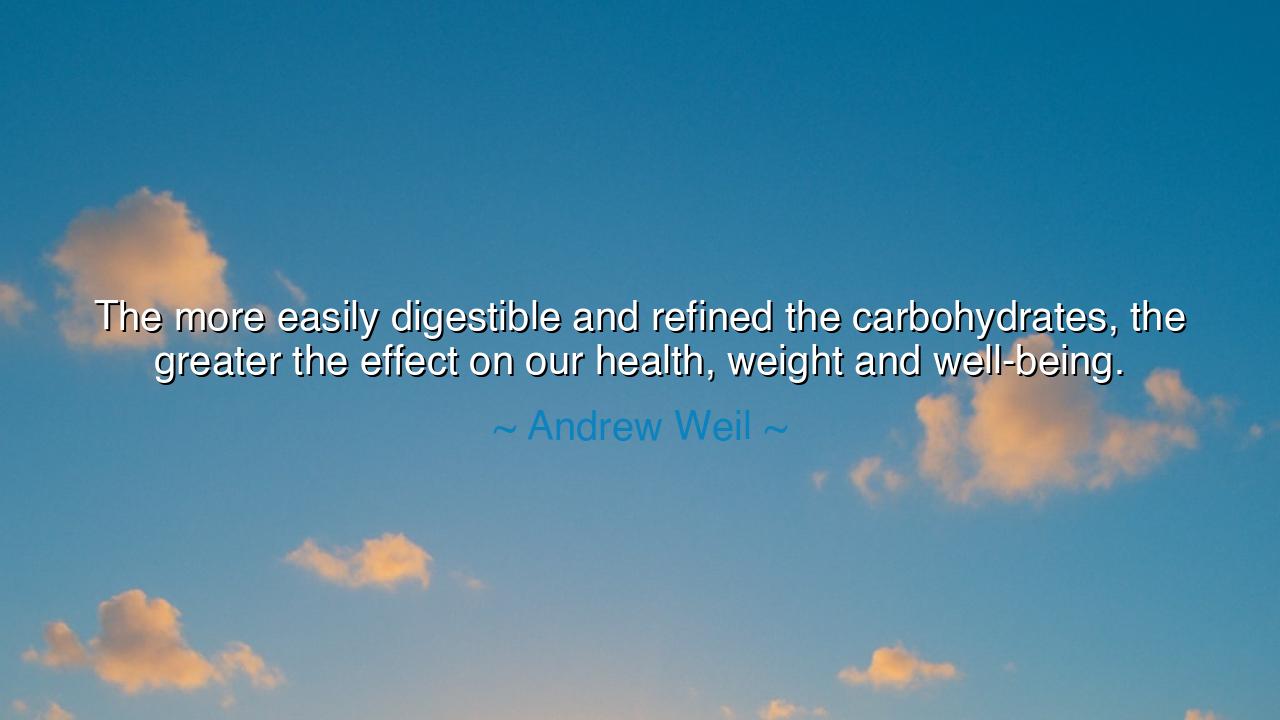
The more easily digestible and refined the carbohydrates, the
The more easily digestible and refined the carbohydrates, the greater the effect on our health, weight and well-being.






In the wise and measured words of Andrew Weil, the physician and teacher of natural healing, we hear a warning wrapped in truth: “The more easily digestible and refined the carbohydrates, the greater the effect on our health, weight, and well-being.” Though it may sound like a lesson of modern science, it is, at its heart, ancient wisdom reborn — a truth that echoes through the ages, reminding humankind that the more we distance ourselves from nature, the more we invite imbalance into our lives. Dr. Weil, a healer who sought harmony between the body and the spirit, spoke not merely of food, but of a deeper principle — that what is refined and artificial may please for a moment, but what is whole and natural sustains for a lifetime.
When he speaks of carbohydrates, he speaks of more than bread or sugar; he speaks of the choices that shape the rhythm of our existence. In the olden days, the human diet was born from the soil, the field, the tree, and the grain. The fruits were eaten as they grew; the grains were ground by hand; the sweetness of honey was a rare treasure. But in our modern haste, we have learned to strip away the husk of the grain, to bleach and refine, to trade patience for pleasure. And though the body still hungers, what we feed it no longer nourishes. These refined carbohydrates, so smooth and sweet to the tongue, burn like dry tinder in the fire of our metabolism — fierce, bright, and short-lived. They leave behind exhaustion, craving, and disease.
Dr. Weil, trained in both medicine and philosophy, sought to restore the balance between human progress and the wisdom of nature. His teachings grew from observation and compassion, from years of studying not only in hospitals but among indigenous healers and traditional communities. He saw that those who lived close to the earth — who ate whole grains, fruits, vegetables, and foods untouched by machines — carried strength and vitality far beyond the reach of modern convenience. And so his words became a beacon to a world sickened by abundance: the more we refine our food, the more we weaken ourselves. For when food loses its wholeness, man loses his harmony.
Consider the story of the island of Nauru, once a place of paradise. For centuries, its people lived on fish, coconuts, and roots drawn from the sea and soil. They were strong and long-lived. But when modern trade brought in white flour, sugar, and processed goods, their health collapsed within a generation. Obesity, diabetes, and heart disease rose like a tide. What had been a paradise of strength became a mirror of modern decay. Thus was Dr. Weil’s teaching proven on the stage of history: the more refined the food, the greater its power to harm.
This truth, however, stretches beyond the body into the soul. For just as the refining of grain strips away its fiber, so the refining of life — our desire for ease and instant satisfaction — strips away our strength of spirit. The food we eat becomes a symbol of the lives we live: quick, sweet, and hollow. Yet, just as the body can be healed by returning to the whole and the natural, so can the heart. The carbohydrates of the spirit — our relationships, our work, our pleasures — must also be unrefined, honest, and real if we are to find true well-being.
Dr. Weil’s message is both scientific and spiritual: that health is not the absence of disease but the presence of balance. To eat food that nourishes, to move with purpose, to live in rhythm with the seasons — these are acts of wisdom older than medicine itself. To heed his words is to remember that the body is not a machine but a garden, and it thrives not on chemicals and shortcuts but on care and patience. Refined food may fill the belly, but only whole food fills the life.
So, my listener, take this teaching into your daily bread. Choose what is alive, what grows, what carries the memory of sunlight. Eat slowly. Respect what the earth gives in its natural form. Let your meals be a communion, not a convenience. For every grain left whole, every fruit eaten fresh, every meal made in mindfulness — these are acts of quiet rebellion against the sickness of haste.
In the end, as Andrew Weil reminds us, well-being is not built in laboratories or found in pills; it is cultivated in the humble act of aligning with nature. Valor grows by daring, said the ancients, and in the same way, health grows by discipline — by daring to resist the easy and the artificial. Feed your body what it was born to receive, and your spirit will find balance once more. For the truest nourishment is that which strengthens not only the flesh, but the harmony between man, earth, and the eternal rhythm of life.






AAdministratorAdministrator
Welcome, honored guests. Please leave a comment, we will respond soon